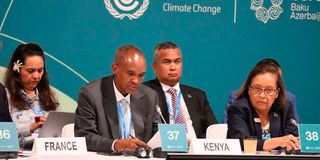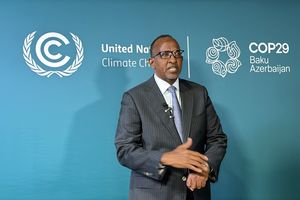Africa’s $1.3 trillion climate finance demand unshakable, negotiators say

Kenya’s Special Envoy for Climate Change, Ali Mohamed, who is also chairman of the African Group of Negotiators, addresses a gathering of global leaders at a side event on climate finance at the COP29 summit in Baku, Azerbaijan.
What you need to know:
- Delegates from countries and coalitions are immersed in heated discussions, each trying to push for their priorities on the global climate agenda.
In Baku, Azerbaijan
It’s day three of COP29, and the atmosphere is growing intense. Delegates from countries and coalitions are immersed in heated discussions, each trying to push for their priorities on the global climate agenda. Central to these debates is something called the draft text—a crucial document that serves as the foundation for any agreements made at COP.

A view shows the venue of the United Nations climate change conference, known as COP29, during a media tour ahead of the summit beginning in Baku, Azerbaijan November 8, 2024.
In the context of climate negotiations, a draft text is a preliminary document that outlines proposed agreements, commitments and policies to address climate issues. These texts are crafted by selected representatives, often called co-chairs, who lead specific negotiation streams. For example, a draft text might address climate finance, emissions reduction targets, adaptation strategies, or loss and damage support.
It is the draft texts that provide a structured basis for countries to negotiate specific language, goals and commitments. So significant are they that even a single word choice can spark intense debate. For instance, using “should” instead of “will” can shift a commitment from a binding obligation to a suggestion and alter the level of accountability, commitment, or urgency expected from countries.
As negotiations progress, these texts undergo multiple revisions to integrate feedback from all involved parties, eventually forming the agreed-upon framework that will be adopted by the conference. Currently, a new text is out and is being scrutinised.
The Climate Action team speaks to Ali Mohamed, Kenya’s Special Envoy for Climate Change and chairman of the African Group of Negotiators, on Africa’s position and expectations at COP29
What are Africa’s primary goals at COP29 in Baku?
We are working towards a positive outcome, especially on the new finance goal, which is critical for Africa and the world. The current financial provisions need to be revised for better balance. Previous proposals from the co-chairs of the New Collective Quantified Goal on Climate Finance (NCQG) were not well received due to significant imbalances. We hope any future draft will be more equitable and inclusive of Africa’s perspectives."
Could you elaborate on why the initial NCQG Text was rejected?
The initial NCQG Text from the co-chairs was imbalanced. It attempted to redefine aspects of the Paris Agreement, especially concerning Article 9, which specifies climate finance obligations. For the developing world, including Africa, this reinterpretation was unacceptable, and we submitted our concerns to have it withdrawn and re-evaluated."
What specific priorities is Africa advocating for at COP29?
Africa’s top priorities include addressing climate adaptation and ensuring survival in the face of increasing climate challenges. With severe droughts affecting southern Africa and unprecedented floods in the Horn of Africa, we are advocating for a financial goal that aligns with the scale of the challenges we face. Africa seeks adequate and reliable climate financing to support our commitment to a low-carbon, climate-resilient transition.
Is there a consensus on the amount of funding required globally?
Yes, there is consensus on the need for significant funding, potentially in the trillions. Africa has consistently pushed for an annual commitment of 1.3 trillion US dollars, a figure that remains our official position. This amount is necessary not only for Africa, but for developing nations globally to meet climate adaptation, resilience and emissions reduction targets."
What is Africa's stance on including “loss and damage” as a sub-goal in the NCQG?
While discussions on this matter are ongoing, we support a climate finance goal that is responsive to the evolving needs of vulnerable countries. The inclusion of 'loss and damage' as a distinct focus within climate finance is vital to address immediate and future impacts in the world’s most affected regions.
I want to emphasise the importance of having a goal that is going to respond to the evolving needs of developing countries and countries that are most vulnerable to the climate catastrophe. The urgency of the climate emergency for millions of people in the Global South cannot be over-emphasised, and Baku presents us with an opportunity to offer leadership and hope.
Does Africa intend to negotiate on the USD 1.3 trillion figure?
No, the 1.3 trillion US dollar figure is a non-negotiable position endorsed by African ministers. This target is reflective of the continent's climate finance needs. While the exact mechanisms of funding are still under discussion, the need for trillions of dollars to support global climate resilience is widely acknowledged."
What are the major obstacles to reaching an agreement on climate finance?
The primary challenge is the ongoing attempt to redefine existing commitments under the Paris Agreement and the United Nations Framework Convention on Climate Change (UNFCCC). Africa firmly opposes reopening discussions on established obligations, especially concerning the flow of funds from developed to developing countries. Developed nations must lead in financing, and this principle should remain unchanged.
What specific changes does Africa seek in the climate finance text?
We want the text to honour the original terms of the Paris Agreement and the UNFCCC. Developed countries have a responsibility to lead in providing climate finance while developing countries are recipients. This is the foundation of the agreements, and we do not support any efforts to renegotiate these terms. The attempt to redefine the commitments and obligations under the Convention and the Paris Agreement has been the biggest obstacle to climate finance negotiations this year, and here in Baku. This is why we had to reject the earlier draft. The Convention is very clear regarding the flow of financing. There are established commitments and obligations. Developed countries must lead in providing the financing, while developing countries are the recipients. This is the core principle of both the Convention and the Agreement, and it is not something we are willing to renegotiate afresh. We cannot reopen the Convention and the Agreement for further negotiation





